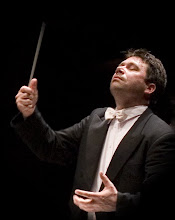It starts to darken early, here at the beginning of the time zone. It’s cold and windy, and raining cats and dogs. Really, the weather is terrible. We cross the river. It looks violent and hostile. In the early days they threw people into the river from the Charles Bridge. Hands and feet bound. How many millions of litres of water have streamed under this bridge since? Kim tells more scary stories of the city’s history. Dripping wet we enter the stage door of the famous Dvorak Hall. The man who guards the building from intruders sits up, looks pitying at us and passes the pile of scores as if he hands over his car keys to a vagabond. I go through the pile. None of the scores have the expected version titles nor numbering, so I have to reconstruct by memory if one of these scores is the version that corresponds with the parts they have in Romania. It’s not looking good. A group of musicians walk toward the exit. I ask them if one of them has the phone number of the cellist Michal Kanka.
One of the musicians, also a cellist, does not have the requested phone number but does have a library card. Thomas, second cellist of the orchestra, takes us through the wet and dark streets of Prague centre, toward the library. The rain is not very convenient when the umbrellas are stolen with the car. The cellist walks us to a beautiful old building with modern interior. Inside the library you have to select your books on a computer screen. It will take about half an hour for the books to become available. The helpful musician stays with us as long as he can before he has to go back to the orchestra to warm up for the concert, which starts at half past seven. He will leave us tickets at the stage door. We might be able to make it to the second half.
In about half an hour they are brought up from the gloomy catacombs to see the neon light. They had twelve, twelve different scores of Bruckner Three! And indeed, the last one, a tiny little study score, was the right one. It is published by the Musikwissenschaftlige Verlag Wien, the only trustworthy Bruckner source and exactly the same score that I lost, albeit a lot smaller. This is great news. Unfortunately the masterwork is not allowed to leave the building. While I start to copy the score on an ancient machine, Kim starts her hunt for coins, first throughout the book house and soon in every possible pub and restaurant nearby. Twenty pages per five minutes, two-hundred-eight pages in all. The library will close at eight pm. Kim goes in and out, bringing small coins like a bird feeding her chicks, so that I can continue the copying. At five minutes to eight, after three announcements in Czech stating that the library is about to close for the day, there are still thirty more pages to copy. I work like crazy. At promptly eight o’clock the lights are switched off. We are in the dark. The green light of the copier throws empty shadows on the walls. The place feels spooky. In no time the guard comes alongside. Quickly I explain to him what happened and why there is no way we are leaving yet. He doesn’t seem to understand much of what I am saying, but I calculated that by the time he would have the police there to throw us out, we would be ready. At three minutes past eight, under loud protest, but with all of the pages of the correct Bruckner Three, we are thrown out of the building and march through the wet darkness back to the concert hall.
We walk quickly to be in time for the second part of the concert, Tchaikovsky’s Pathetique. The guard at the stage door has changed. If possible, this new face looks even more astonished to see the two drowned people entering in their sodden street clothes. There are no tickets from Thomas. He looks in every corner of his desk. Thomas must have forgotten. Our story however, made its rounds in the orchestra field; a woman from the administration heard about the car theft of the Dutch conductor, and gives us two tickets that have not been collected. I thought I saw the word ‘ambassador’ written on the envelope she took the tickets from. Apparently a cultural barbarian didn’t show up. Armed with two tickets we have to walk around the building back into the pouring rain to go to the main entrance, up the monumental stairs rising between the dark dripping statues.
In the foyer ten astonishingly well dressed older men hang visibly bored on the sides of the wardrobe. Three of them jump up to prevent the two homeless from entering the building. “We are here to listen to the second half of the concert sir”... disbelief on their faces is the only answer. Being quite silly by now, I start to conduct and sing the opening of Tchaikovsky’s Pathetique. It evokes the other men to jump up. ”Silence, silence! There is a concert going on here.” I am sure they make more noise than I do. We are asked whether we have tickets... oh, yes of course, tickets, the magical papers. “Here you are.” I can feel their eyes burning into in my back when we walk up the marble staircase where Dvorak once walked, leaving a trail of water and mud behind us.
To be continued, stay tuned!
